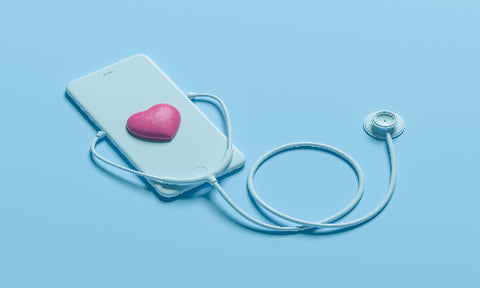It is said that when menopause approaches, symptoms of hot flashes such as hot flashes, sweating, and hot flashes become more likely to appear due to hormonal balance and disturbances in the autonomic nervous system.
If the symptoms of hot flashes are severe, it is recommended to consult a doctor, but many studies have reported that symptoms can be alleviated by improving your diet as self-care.
In this article, we will introduce nutrients and foods that are effective in relieving hot flash symptoms based on research data.
If you are going to the hospital or taking medication, be sure to do so under the guidance of a doctor.
[I can understand you in just 3 minutes]
Click here for a free medical interview supervised by a doctor that can be done on LINE
Foods to avoid when experiencing hot flash symptoms

People who experience hot flashes may be able to reduce their symptoms by being careful about what they drink and eat. Specifically, I will introduce you to the drinks and foods you want to be careful of.
- Avoid strong stimulants such as hot peppers
- Be careful with caffeine and alcohol
- Actively consume foods containing high-quality dietary fiber and low GI foods
- Regular meal intervals
Regarding caffeinated beverages, it is said that the frequency of hot flashes increases as caffeine intake increases1).
We do not know that irritants such as hot peppers directly cause hot flashes. However, you need to be careful as the stimulation may cause you to feel hot flashes on your face .
Similarly, alcohol is also a beverage that people with hot flashes should be wary of, as it can make your face feel hotter2 ).
As for the contents of the meal, it is known that hot flashes are likely to occur due to fluctuations in blood sugar levels, so it is better to try to eat a so-called low GI (glycemic index) diet that gently raises blood sugar levels. 3) It is also important to be conscious of a diet high in dietary fiber and reduce the intake of sugar-sweetened beverages.
It is recommended to replace the staple food with whole grains in order to have a diet that is high in dietary fiber and conscious of a low GI diet .
Finally, there is the issue of meal timing. Prolonged hunger and low blood sugar levels can exacerbate hot flashes4). Be mindful not only of what you eat, but also of the intervals between meals.
Recommended foods for hormonal imbalance during menopause

"Soybean" is recommended for menopausal hormonal imbalance. The reason why soybeans are recommended is that ingesting soy isoflavones contained in soybeans may reduce hot flashes during menopause5 )6).
However, hormonal imbalance does not improve just by being conscious of eating soybeans and soybean products. The important thing is to be evenly conscious of the content of your meals, including staple foods, side dishes, and the balance of main dishes, as well as meat and vegetables. Eating a variety of foods, including meat and vegetables, may help reduce menopausal hot flashes7 ).
During menopause, please be aware of the correct dietary balance and take measures against hormonal imbalance while skillfully incorporating soy foods.
Also read the following articles
Introducing 5 foods that menopausal women should eat
Incorporating Chinese herbal medicine may lead to alleviation of various symptoms
Taking herbal medicine is also effective for painful menopausal symptoms. Kampo medicine comprehensively reviews various things such as the person's constitution and lifestyle, and gradually improves symptoms from the inside of the body. There are various herbal medicines, but the herbal medicines that are effective for menopausal symptoms are as follows.
- Kamishoyosan: Depression, irritation, hot flashes, hot flashes, etc.
- Toki shakuyakusan: Tendency to coldness and anemia
- Keishibukuryogan: Hot flashes, headache, lower abdominal pain, etc.
There are individual differences in menopausal symptoms, and it is necessary to take Chinese herbal medicine that matches the symptoms . Kampo medicine gradually improves the symptoms, so it is easy to incorporate it into your life, so if you want to alleviate the symptoms little by little, please consult your doctor or pharmacist.
▼ You can consult Kampo on LINE
Click here for a free consultation supervised by a doctor
summary
If symptoms do not improve or persist for a long time, please consider visiting a medical institution.
If you are concerned about your hormone balance, you can self-check at home with the canvas hormone test kit.
You can read more about the canvas inspection kit here .
[I can understand you in just 3 minutes]
Click here for a free medical interview supervised by a doctor that can be done on LINE
References
1) Kandiah, Jay and Valerie Amend. “An Exploratory Study on Perceived Relationship of Alcohol, Caffeine, and Physical Activity on Hot Flashes in Menopausal Women.” Health 2 (2010): https://api.semanticscholar.org/CorpusID: 25675544
2) Mohyi D, et al. Differential diagnosis of hot flashes. 1997 https://pubmed.ncbi.nlm.nih.gov/9288692/
3) "Sharon Dormire.The Effect of Dietary Intake on Hot Flashes in Menopausal Women.2007" https://www.maturitas.org/article/S0378-5122(21)00076-1/fulltext
4) Mohsenian S, t al. Carbohydrate quality index: Its relationship to menopausal symptoms in postmenopausal women.2021 https://pubmed.ncbi.nlm.nih.gov/34274075/
5) Cas sidy A, Albertazzi P, Lise Nielsen I, Hall W, Williamson G, Tetens I, Atkins S, Cross H, Manios Y, Wolk A, Steiner C, Branca F. Critical review of health effects of soyabean phyto-oestrogens in post-menopausal women. Proc Nutr Soc. 2006. https://pubmed.ncbi.nlm.nih.gov/16441947/
6) Chen LR, Chen KH. Utilization of Isoflavones in Soybeans for Women with Menopausal Syndrome: An Overview. Int J Mol Sci. 2021. https://pubmed.ncbi.nlm.nih.gov/33809928/
7) Zhang Q, Li F, Yu Y, Yu X, Sheng Q, Zhang X. Differential factors associated with hot flashes in Chinese perimenopausal and postmenopausal women. Maturitas. 2009 May 20;63(1):94-8. doi: 10.1016/j.maturitas.2009.02.007. https://pubmed.ncbi.nlm.nih.gov/19321276/








